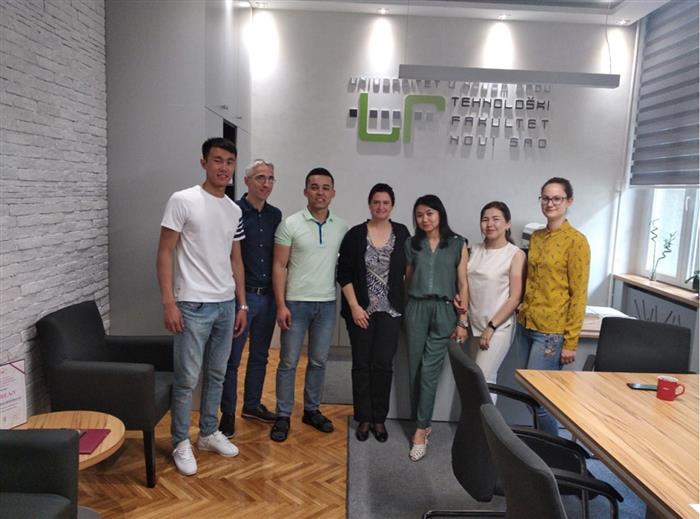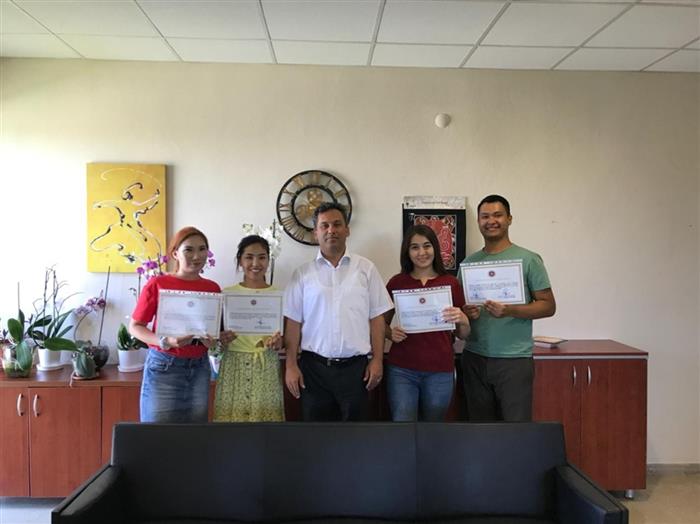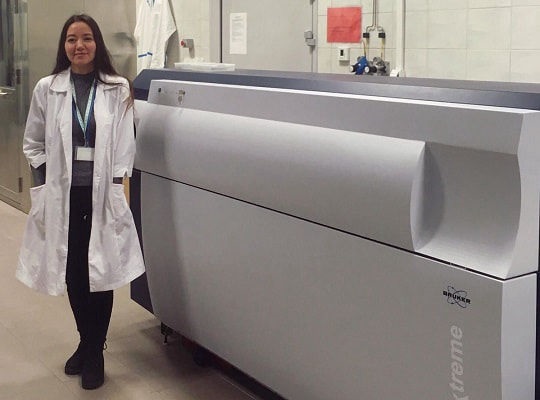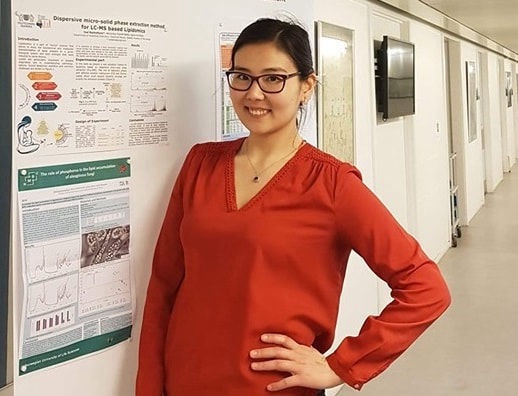7M05301 - Chemistry
|
Educational program |
|
|
Field of education |
7M05 Natural sciences, mathematics and statistics |
|
Direction of personnel training |
7M053 Physical and chemical sciences |
|
Group of educational programs |
M089 Chemistry |
|
EP purpose |
Training of highly qualified personnel with professional competencies sufficient for the development of new knowledge and effective solutions of research and applied problems in the field of modern theoretical chemistry and chemical industry. - research in various fields of modern chemistry; - creation of new types of chemical products and materials, improvement of existing and development of new chemical processes based on the latest achievements in the field of chemistry and related disciplines in accordance with the needs of the market, industry and agriculture; - improvement and development of methods of quality control, standardization and certification of raw materials and chemical products; - secondary, professional and higher education. |
|
Language of education |
Kazakh/Russian/English |
|
Volume of the credits |
120 |
|
The awarded academic degree |
Master of Natural Sciences on the educational program "7M05301 - Chemistry" |
|
Educational outcome |
As a result of mastering the program, the master will be able to 2) integrate the latest achievements of science and practice in the field of chemistry into the practical activities of a research chemist, a teacher chemist to solve professional tasks, including in a wider interdisciplinary context, focused on achieving environmental, social, economic and other goals; 3) conduct a systematic search and prepare a scientific review of the state of modern scientific research on a specific topic; 4) carry out the analysis of scientific information for the formulation of scientific hypotheses in the framework of its own research; 5) implement independently the formulation of the goal and objectives of scientific research, as well as the expected result, on the basis of a critical analysis and evaluation of modern scientific concepts, achievements and research in the studied / profile field of chemistry; 6) make a reasonable choice of methods, techniques, computer programs and applications of mathematical modeling and calculation, to control the process, including technological, performing a scientific experiment, processing and generalizing the results obtained; 7) analyze and interpret the obtained data (process control, scientific research results) to substantiate their reliability and value in the framework of modern concepts and theories in the field of chemistry; 8) apply fundamental and modern knowledge and methodology of physicochemical research to develop new and improve existing methods for producing substances and materials with specified characteristics, research methods of substances, materials and processes, technological processes or their stages; 9) carry out qualitative and quantitative modeling of the process in order to establish its mechanism, ways of its regulation, to obtain a product with specified characteristics or to increase its output, to determine the optimal conditions for its implementation and control; 10) develop a curriculum for teaching chemical disciplines in the context of modern achievements in the field of chemistry and the requirements of higher education pedagogy; 11) present the results of your own research in the chosen field of chemistry in the form of a scientific publication; 12) continue independent and autonomous training for creative self-development and self-improvement, for the development of basic and subject-matter competencies during the entire professional activity. |
After studying this educational program, you will be a specialist in the field of chemistry.
Your possible professions:
- Teacher of secondary and higher education
- Sales manager for chemical and petrochemical equipment
- Junior Researcher (JR);
- Technologist;
- Laboratory assistant;
- Analyst-chemist
Related types of professional activities in the educational program "Chemistry" are:
- Oil and gas processing technology
- Drilling oil and gas wells
- Maintenance and repair of equipment for oil refining and chemical industries
- Exploitation of oil and gas fields
- Rubber production
- Operation and maintenance of environmental installations
- Agronomy and agrochemistry
- Butter and cheese production
- Electrical production
- Production of accumulators and batteries
- Analysis of the composition and properties of materials using chemical and physico-chemical methods of analysis
Examples of vacancies for specialists with similar skills (hh.kz, knopka.kz, February 2023)
|
Vacancy |
Salary |
Organization |
Qualifications and requirements |
|
Lecturer (teacher) of chemistry at educational center |
250 000 – 650 000 KZT |
Fibonacci IE, Almaty |
Responsibilities: Teaching mathematics to schoolchildren of grades 5-11 according to the programs: school, preparation for the UNT / KTA, USE, for international exams SAT, GMAT, etc. Requirements: Possession of a diploma of higher education in the fields of teaching, technical or natural sciences. Experience in the field of teaching |
|
Analytical chemist |
up to 200 000 KZT |
DOSFARM LLP, Almaty |
Responsibilities: Performing physical and chemical tests of intermediate / finished products, raw materials, materials, performing validation work. Timely completion of working documentation, development of regulatory documentation Requirements: Higher chemical education (preferably in the field of analytical or organic chemistry). Preferably (not required) knowledge of pharmaceutical standards: GMP, GDP. |
Key employers for future employment of graduates:
|
Name |
City |
|
"Nazarbayev Intellectual Schools" JSC, vocational schools, lyceums, colleges |
Cities of Kazakhstan |
|
Universities and research institutes of the chemical profile |
Cities of Kazakhstan |
|
"KazMunayGas" JSC |
Atyrau, Pavlodar, Shymkent |
|
United Chemical Company LLP |
Astana |
|
Kazphosphate LLP |
Almaty, Taraz |
|
Agrochemistry LLP |
Almaty |
|
Kazakhmys Corporation LLP |
Astana, Karaganda, Zhezkazgan, Satpaev |
|
Plant Protection and Quarantine KazRSI LLP |
Almaty |
|
"U.Uspanov Soil Science and Agrochemistry KazRSI» LLP |
Almaty |
The educational program is relevant for a specific area of employment in the field of chemistry:
- companies of various profiles, mining industries, extraction of mineral raw materials for the chemical industry and fertilizer production,
- production of refined products, chemical industry,
- sanitary and epidemiological institutions, institutions that carry out technical tests and analyzes,
- research institutes and organizations in the field of natural sciences and engineering of Kazakhstan and abroad.
Students enrolled in a joint educational program
|
Name |
Educational program |
University |
|
Adilkhan Seipiev |
7M05319 - Chemical materials science |
M.V. Lomonosov Moscow State University, Russia |
|
Valeria Volobueva |
7M05302 - Chemistry (BelSU) |
Belgorod National Research University, Russia |
|
Zhansaya Zhadil |
7M05302 - Chemistry (BelSU) |
Belgorod National Research University, Russia |
|
Zhanuzak Kapizov |
7M05302 - Chemistry (BelSU) |
Belgorod National Research University, Russia |
|
Farida Kerimbay |
7M05302 - Chemistry (BelSU) |
Belgorod National Research University, Russia |
|
Khalifa Seitkhan |
7M05302 - Chemistry (BelSU) |
Belgorod National Research University, Russia |
|
Description of the advantages and distinctive features of the EP in terms of positioning in the market of educational services |
EP accreditation: ASIIN international accreditation. Validity period: 03/31/2017-09/30/2022 There are joint EPs (SOPs) and double-diploma OPs (DDOPs). Material and technical base of the EP: To implement the educational program, the faculty has laboratories: for analytical, colloid, physical, inorganic, organic chemistry and chemistry of macromolecular compounds Personnel potential: 41 lecturers, including 12 doctors of sciences, 19 candidates of sciences, 10 PhDs. Practice bases: research institutes of CPCMA, the State Enterprise "RSINCTM", universities, schools, technical schools, colleges, oil, petrochemical, oil and gas companies, oil refineries, pharmaceutical factories, chemical laboratories, etc. Academic mobility As part of academic mobility, undergraduates of the "7M05301 - Chemistry" educational program have the opportunity to train and study at partner universities: M.V. Lomonosov Moscow State University (Russian Federation), Babes-Bolyai University (Romania), Northern Arctic Federal University (Russian Federation), Nicolaus Copernicus University (Poland), Aix-Marseill University (France), Greiswald University (Germany), V.S. Sobolev Institute of Geology and Minerology (Russian Federation), Georgetown University (Malaysia), La Rochelle University of Science (France), Potsdam University (Germany), Karachi University (Pakistan), Purdue University (USA), Reading University (UK) and others. Double-degree programs with Belgorod State National Research University (Russian Federation) and M.V. Lomonosov Moscow State University (Russian Federation) are available. Scientific schools or scientific directions of the department (scientific projects): The faculty has research schools (analytical chemistry, colloid chemistry, inorganic chemistry, organic chemistry, physical chemistry, chemical physics, catalysis, chemistry of macromolecular compounds); the widest range of scientific research in the field of chemistry within the framework of projects and programs of grant funding and economic contract projects. Comparison with similar programs of foreign universities: M.V. Lomonosov Moscow State University http://www.chem.msu.ru/rus/teaching/education-program/welcome.html, McMaster University https://www.chemistry.mcmaster.ca/graduate/graduate-courses.html#6AA3 University of North Carolina Chapel Hill http://www.catalog.unc.edu/graduate/schools-departments/chemistry/#coursestext, University of Wisconsin-Madison https://www.chem.wisc.edu/content/courses#, University of Michigan https://lsa.umich.edu/content/dam/chem-assets/chem-docs/graduate/GradHandbook_2017-2018_FINAL.pdf Cornell University rl23@cornell.edu, ao98@cornell.edu Оrebro university https://www.oru.se/english/study/master-students/master-programmes/1819/?pid=858 Uppsala university http://www.uu.se/en/admissions/master/selma/kursplan/?kpid=16554&kKod=1KB103 |
 |
 |
| Undergraduates of the EP Chemistry on an internship at the University of Novi Sad (Serbia, Novi Sad) | Undergraduates of the EP Chemistry on an internship at the Izmir Institute of Technology (Turkey, Izmir) |
 |
A graduate of the Chemistry program, Gulyaim Sagandykova, worked in the Biosphere Ecology Laboratory (CPCMA) and developed a method for the quantitative determination of the main volatile organic compounds in wines by gas chromatography-mass spectrometry combined with solid-phase microextraction. Actively participated in the implementation of the ISTC international project K-1983. In 2017, she won a grant for an internship from the Shakhmardan Yessenov Foundation at Open University (UK). In 2021, she successfully defended her dissertation at the Department of Analytical Chemistry, Nicolaus Copernicus University (Torun, Poland). In 2019, she won a prelidium grant for the implementation of a project to develop plates for the analysis of low molecular weight compounds using the MALDI-TOF-MS method. |
 |
A graduate of the "Chemistry" program Inal Bakhytkyzy worked in the laboratory "Ecology of the Biosphere" (CPCMA) from 2014 to 2015 and was engaged in the development of a method for determining the products of transformation of rocket fuel based on solid-phase microextraction and gas chromatography with mass spectrometric detection. She graduated from the master's program in "Chemistry" in 2015. In the same year, she won a grant for the Erasmus Mundus Master in Quality in Analytical Laboratories (EMQAL) program. As part of this program, she studied for a year at the Gdansk University of Technology, and for a year at the University of Barcelona, where she developed food analysis methods using liquid chromatography, spectrophotometry and mass spectrometry. Currently she is a PhD student at the Department of Analytical Chemistry of Gdansk University of Technology. |








